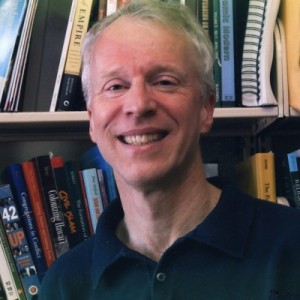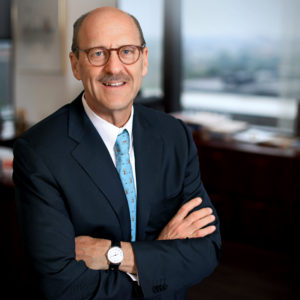Washington University in St. Louis sociocultural anthropologist John R. Bowen and David H. Perlmutter, MD, dean of the School of Medicine, join the likes of President Barack Obama, actor Tom Hanks and Supreme Court Justice Sonia M. Sotomayor as newly elected members of the American Academy of Arts and Sciences, the academy announced April 18.
Founded in 1780, the academy honors exceptional scholars, leaders, artists and innovators and engages them in sharing knowledge and addressing challenges facing the world. The new members of the academy were elected in 25 categories and are affiliated with 125 institutions.
The 238th class of new members is available at www.amacad.org/members.
Previous class members from Washington University include Chancellor Mark S. Wrighton, Barbara Schaal, dean of the faculty of Arts & Sciences, scientific innovator Philip Needleman and the late writer William Gass, among some 52 overall.

Bowen, the Dunbar-Van Cleve Professor in Arts & Sciences, is an internationally recognized scholar on contemporary efforts to rethink Islamic norms and law in Asia, North America and Europe.
His research explores broad social transformations now taking place in the worldwide Muslim community, including social challenges related to cultural pluralism, immigration, law and religion, legal reasoning, and religion and ritual. In particular, he analyzes how Muslims (judges and scholars, public figures, ordinary people) deal with diverse interpretations of the Islamic tradition and other conflicts related to local social norms, values, legal codes and decisions.
A member of the anthropology faculty here since 1985, Bowen earned his PhD in anthropology in 1984 from the University of Chicago. He also serves as a visiting professor at the London School of Economics and Political Science and as an associate professor of Groupe Sociétés, Religions, Laïcités, Paris.
Following early research in Indonesia and Southeast Asia, Bowen has shifted focus in recent decades to understanding Muslim life in western Europe, France, Britain and the Netherlands. His ongoing collaborations with students and colleagues include ethnographic research at sites across the Middle East and Africa. In recent years, his work has been recognized with prestigious Guggenheim and Carnegie fellowships.
He currently serves as director of the Trans-Atlantic Forum. He served as president of the Scientific Council of the French Network of Institutes for Advanced Study from 2008 to 2017 and as chair of the Council for European Studies (New York) from 2011-13. He is on the editorial boards of various journals, including the Political and Legal Anthropology Review and Studia Islamika (Jakarta).
Bowen is the author of numerous book chapters, journal articles and an array of critically acclaimed books. His latest book, “On British Islam: Religion, Law, and Everyday Practice in Shari`a Councils,” was published in 2016 by Princeton University Press.
His popular textbook on “Religions in Practice: An Approach to the Anthropology of Religion,” first published in 1998, is now in its seventh revised and updated edition. His 2012 book, “Islam, Law and Equality in Indonesia: an Anthropology of Public Reasoning,” received the Herbert Jacobs Book Prize from the Law and Society Association.
Other books for general audiences include “Blaming Islam” (2012), which has since been translated into French, German and Turkish; “A New Anthropology of Islam” (2012); “Can Islam Be French? Pluralism and Pragmatism in a Secularist State” (2010); and “Why the French Don’t Like Headscarves: Islam, the State, and Public Space” (2007).

Perlmutter, the Spencer T. and Ann W. Olin Distinguished Professor and executive vice chancellor for medical affairs, is internationally recognized for his research on alpha-1 antitrypsin deficiency (ATD), a genetic disorder in which the accumulation of a misfolded protein in liver cells can result in severe liver failure.
His work has led to advances in the basic understanding of how cells dispose of misfolded proteins that are toxic and cause cellular dysfunction.
To evaluate potential treatments for ATD, he and colleagues developed a pipeline of drugs that includes one in a Phase II/III clinical trial. The goal is to eliminate the need for liver transplantation, the only treatment option for patients with progressive liver disease due to ATD.
Drugs in this pipeline target and enhance a cellular degradation pathway termed autophagy, which is critical for the functioning of all cells. Because the decline in the function of the pathway during aging has been linked to degenerative diseases, these drugs represent exciting candidates for prevention of cognitive decline and other degenerative diseases of aging.
Perlmutter was trained at Children’s Hospital of Philadelphia and Boston Children’s Hospital and has been on the faculties of Harvard Medical School, University of Pittsburgh and Washington University.
Prior to his appointment in 2015 at Washington University, he was a distinguished professor and the Vira I. Heinz endowed chair of the Department of Pediatrics at the University of Pittsburgh, as well as physician-in-chief and scientific director of the Children’s Hospital of Pittsburgh of the University of Pittsburgh Medical Center (UPMC).
Perlmutter is a member of the National Academy of Medicine, chair of the Medical Sciences Section of the American Association for the Advancement of Science, past president of the Society for Pediatric Research and a past member of the Advisory Council of the National Institute of Diabetes and Digestive and Kidney Diseases.
He has received numerous awards, including the E. Mead Johnson Award for Research in Pediatrics from the American Pediatric Society, and the Sass-Kortsak Award for Pediatric Liver Research from the Canadian Liver Association. He has authored more than 200 scientific publications and holds nine U.S. patents or patent applications.
The new class will be inducted at a ceremony in October in Cambridge, Mass., and join the academy members who came before them, a list that includes: Benjamin Franklin (elected 1781) and Alexander Hamilton (1791) in the 18th century; Ralph Waldo Emerson (1864), Maria Mitchell (1848), and Charles Darwin (1874) in the 19th; and Albert Einstein (1924), Robert Frost (1931), Margaret Mead (1948), Milton Friedman (1959) and Martin Luther King Jr. (1966) in the 20th.